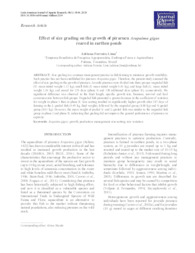Effect of size grading on the growth of pirarucu Arapaima gigas reared in earthen ponds.
Effect of size grading on the growth of pirarucu Arapaima gigas reared in earthen ponds.
Autoria: LIMA, A. F.
Resumo: Size grading is a common management practice in fish farming to minimize growth variability. Such practice has not been established for pirarucu Arapaima gigas. Therefore, the present study assessed the effect of size grading on the growth of pirarucu. Juvenile pirarucu were divided into three groups: ungraded fish (U: mean initial weight 1.12 kg), small fish (S: mean initial weight 0.81 kg), and large fish (L: mean initial weight 1.36 kg), and reared for 129 days (phase I) and 158 additional days (phase II), consecutively. No significant difference was observed in the final length, specific growth rate, biomass, survival and feed conversion rate between fish groups. Ungraded fish presented a greater decrease in the coefficient of variation for weight in phase I than in phase II. Size sorting resulted in significantly higher growth after 287 days of farming in the L-graded fish (9.49 kg, final weight), followed by the ungraded group (8.80 kg) and S-graded group (8.01 kg). However, the mean weight of pooled S- and L-graded fish was similar to the ungraded fish group in phase I and phase II, indicating that grading did not improve the general performance of pirarucu in captivity.
Ano de publicação: 2020
Tipo de publicação: Artigo de periódico
Unidade: Embrapa Pesca e Aquicultura
Palavras-chave: Arapaima gigas, Fish ponds, Peixe, Pirarucu, Produção Pesqueira, Tamanho, Variação Genética
Observações
1 - Por padrão são exibidas publicações dos últimos 20 anos. Para encontrar publicações mais antigas, configure o filtro ano de publicação, colocando o ano a partir do qual você deseja encontrar publicações. O filtro está na coluna da esquerda na busca acima.
2 - Para ler algumas publicações da Embrapa (apenas as que estão em formato ePub), é necessário ter, no celular ou computador, um desses softwares gratuitos. Sistemas Android: Google Play Livros; IOS: iBooks; Windows e Linux: software Calibre.
Acesse outras publicações
Acesse a Base de Dados da Pesquisa Agropecuária (BDPA) para consultar o acervo completo das bibliotecas da Embrapa.

